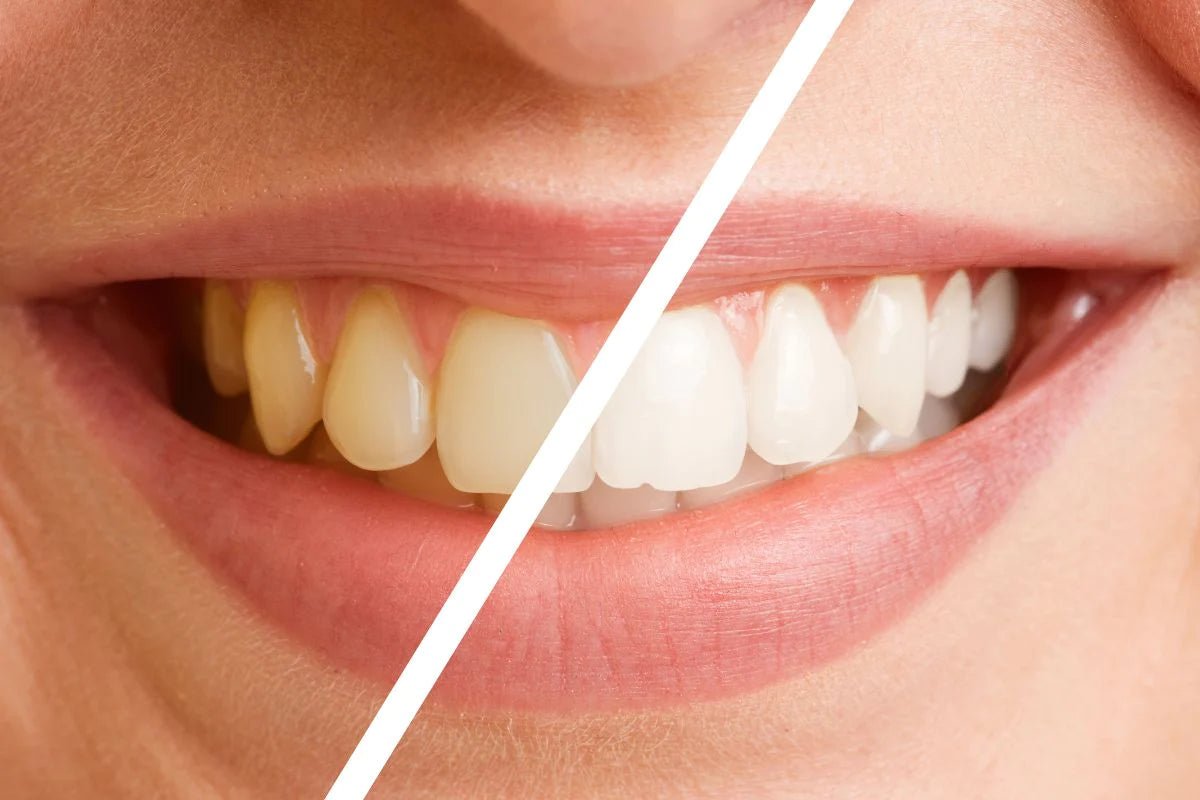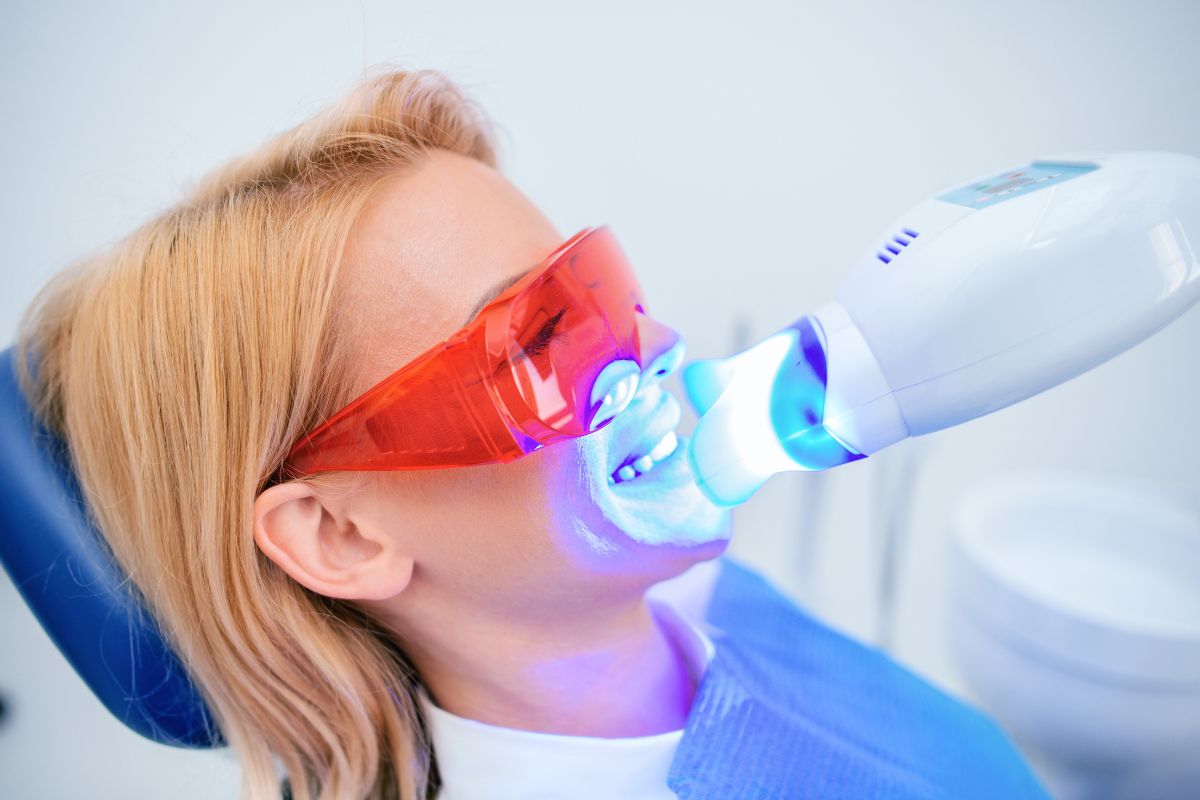Can Teeth Whitening Damage Tooth Enamel?
There is no conclusive evidence linking professional teeth whitening procedures to enamel damage. However, many still believe the contrary. In fact, in an online survey, 28% of the participants think that teeth whitening treatments damage the teeth, while 40% remain clueless on whether such is true or not.
Good thing we got this article to serve as your guide. This post will put you in perspective as we bust all the myths surrounding teeth whitening procedures.
Let us first begin with the basics.

What is tooth enamel?
Tooth enamel is the thin outer layer of the teeth structure called the crown. It is a protective natural coating of the teeth, acting as the primary defense of the teeth’s inner layer (the dentin) against damage.
Here’s a fun fact:
tooth enamel is the hardest tissue in the human body. It is even harder than your bones. And although a paper-thin, the only substance stronger than the enamel is diamond.
Yet even if the enamel is highly mineralized (mainly phosphate and calcium), this does not exempt it from breaking and damage. A heavy force can still tip off its parts, and chemical reactions can also erode it into pieces. Once this protective layer is compromised, severe sensitivity arises due to the exposure of the dentin. Not only that, potential dangers to your oral health, including pulp infection and tooth loss, might also occur.
What causes enamel erosion?
You have probably heard about enamel erosion and wondered about it.
Enamel erosion is the wearing away of the tooth surface as an aftermath of several causes. This includes:
- Poor Oral Hygiene
- Malnutrition
- Aging
- Strong appetite for Sugary, Starchy, and Acidic Foods and Beverages
- Xerostomia or the Dry Mouth Condition (that is when the salivary glands do not produce enough saliva to neutralize acidity in the mouth)
- Medications contributing to Xerostomia
- Teeth grinding
- Improper flossing
- DIY teeth whitening solutions
Avoiding the abovementioned causes will save your teeth’ enamel from erosion.
Just a quick, interesting fact:
Did you know that the greatest protector of the enamel is your saliva? The saliva constantly coats your teeth in a layer of calcium that fights back bacteria. It also helps eliminate set-in particles in the mouth and neutralizes acidity as well.
That is why a chronic dry mouth condition is considered detrimental to your teeth condition.
So now, if the enamel protects the inner layer of the teeth, it should never be compromised. For once the enamel has eroded, it can never regenerate and regrow. Remineralization can prevent further enamel erosion, but it can never restore the teeth to their original state.
What does a weak enamel look like?
Weak enamel can be spotted in two ways: its appearance and, second, its sensitivity.
To put things into context, it is vital first to categorize how your teeth naturally look and how discoloration happens over time. Why? Because discoloration is one of the signs of weak enamel. It may be pale white or crystal yellow, depending on the progression of the tooth discoloration from its original shade.
The presence of random white and shiny spots on the teeth matched with cup-like indentations on the teeth’ surface also shows a weak enamel. There are also cases where the enamel is too translucent- meaning it is thinner than normal.
The increased sensitivity of your teeth to hot, cold, acidic, and even spicy food and drink signals a weakening enamel. It’s because the sensitive dentine is almost exposed to the outer cast. Over time, this sensitivity will turn into pain once proper interventions are not given.

How does teeth whitening work?
Teeth whitening procedures vary in approach and style. Yet a common science is involved in all of these procedures – bleaching out all stains in the discolored teeth to make them look perfectly white.
Today, there are three ways how you can whiten your teeth. These can be through professional teeth whitening procedures, over-the-counter teeth whitening products, and home-based teeth whitening methods.
For your easy reference, here’s a quick guide:
| Treatment | Technique/ Approach | Average Cost |
| Professional Teeth Whitening Procedure | • Usually, an in-office treatment with the full guidance of a professional • The dentist uses a whitening gel activated by a specialized lamp Commonly performs Zoom Whitening Treatment |
$500 |
| Over-the-Counter Teeth Whitening Products | • Usually prescribed by a dentist as they are approved to be clinically safe and effective • The products vary, be it a whitening strip or a gel |
$30 - $100 |
| Home-based Teeth Whitening Methods | • With proper guidance and assistance from your dentist • Uses home-based natural solutions to whiten teeth |
$10 - $30 |
All these must be performed with proper guidance and help from a dental professional. Culver City Dentist United Dental Care warns everyone to refrain from DIY teeth whitening solutions and techniques as they could potentially harm the teeth. Proper guidance from a professional is always advised.
The Effect of Teeth Whitening on Tooth Enamel
Here goes a lot of myths concerning the effects of teeth whitening on the enamel. Let us identify these, one by one:
1. Teeth Whitening causes an Extreme and Unavoidable Sensitivity
This isn’t true. Professional teeth whitening can be painless. A certain level of sensitivity is normal, yet it is not something that you must consider extreme or even painful.
2. Teeth Whitening makes your Teeth look Unnatural
This is also not true. Professional teeth whitening is done with the art and science of cosmetic dentistry to match the natural tone of pearly white teeth.
3. Teeth Whitening damages the enamel
No. Although sensitivity is experienced due to the removal of the teeth stains, professional teeth whitening does not cause any threat to the enamel. The bleaching agent leaves the enamel in perfect condition while being able to remove deep stains.
Also, some of the related and common misconceptions include:
1. The DIY Teeth whitening that Uses Hydrogen Peroxide is safe
No. The unregulated use of hydrogen peroxide can cause tissue damage. That is why it is still advised to choose a dental expert.
2. Baking Soda as the Teeth Whitening Agent is Safe
No. Sodium hydrogen carbonate, or baking soda, is abrasive and, therefore, can cause damage to your enamel.

Conclusion
There is, therefore, no scientific basis supporting the common belief that teeth whitening procedures damage the enamel. A certain level of sensitivity isn’t proof of any side effect relative to enamel erosion.
Although there are more convenient ways to whiten your teeth through the proper guidance of a professional, no option can equate to the results of an in-office treatment.
Get a Professional Teeth Whitening Work in Culver City
It takes sufficient knowledge and professional advice from your dentist before you get any cosmetic dental procedure. Otherwise, this might cost you a lot of money and even emotional distress.
The same is true when one needs to have professional teeth whitening procedure. Proper assistance from a professional is advised.
Our dental experts in Culver City Dentist United Dental Care specialize in championing a positive approach to dentistry, ensuring that your goal of achieving a brilliant smile will materialize perfectly.
You deserve a pearly white smile. Let not the myths surrounding this procedure interfere with your thoughts.
Check out Culver City Dentist United Dental Care and experience a pain-free teeth whitening procedure.






